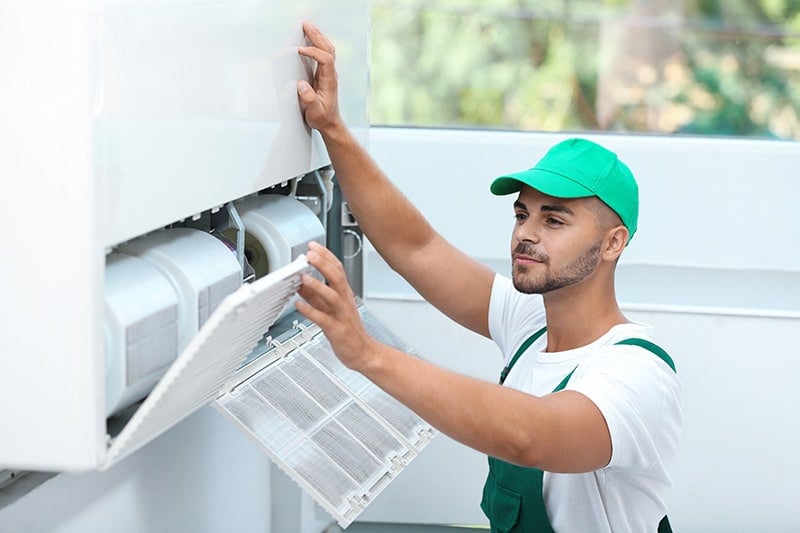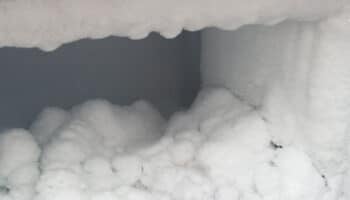Are you having a hard time getting your Bosch refrigerator to cool down? Then take a look at 13 reasons why the issue happens and what you can do to repair your appliance.
The most common reasons for a Bosch fridge to stop cooling are that the plug socket or fuse doesn’t work, the condenser coils need cleaning, or the appliance needs repositioning. It could also be that the refrigerator is overloaded or the door gaskets need cleaning.
Below, I’ve prepared a list including 13 reasons why your Bosch refrigerator isn’t cooling and what you should do to fix it.
Ready? Let’s dive in!
Why trust us? This article was written by Craig Anderson and Andy Fulenchek.
Craig has helped thousands of other homeowners repair their appliances since 2016.
Andy is one of our resident appliance repair experts with over a decade of experience. He currently runs his appliance repair company with a team of trusted technicians.
13 Ways to Fix a Bosch Refrigerator That Isn’t Cooling Properly
Bosch fridges are known to have cooling issues in a variety of situations. In my experience, a good general solution is to reset the appliance by pulling the plug for 5 minutes. If a hard reset fails, the lack of cooling can be due to a faulty component or the fridge being set up incorrectly.
Let’s cover each of them one by one.
#1 Check Your Plug Socket
When your Bosch refrigerator is not cooling, my usual advice is to check your plug socket first. Over time, your fridge’s power cord or the wall outlet you plug it into can fail, causing many problems. Here’s what you can do in such cases:
- Check that your power cord is intact and that you have plugged your refrigerator in properly. Does the power cord show signs of damage? If so, you’ll need to replace it.
- Test the power socket with another electrical appliance. You can use any appliance, such as a kettle or hairdryer. If the power socket does not work, you will have to get an electrician to repair it. In the meantime, move the fridge to a working power source.
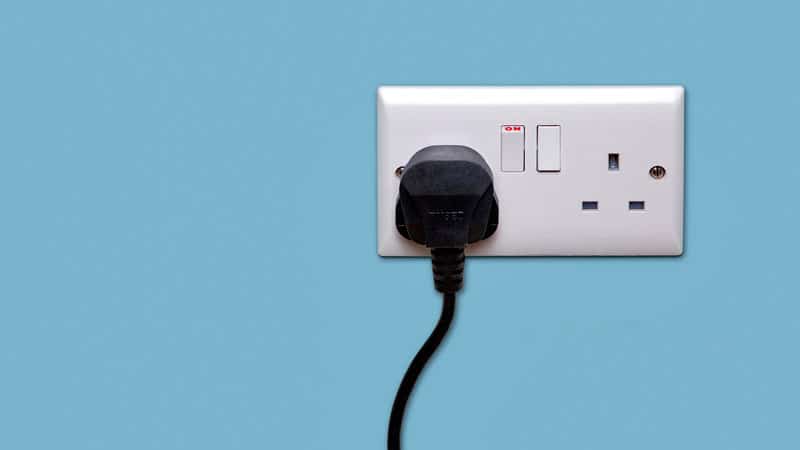
There’s always the possibility that your fridge is getting enough power to keep its lights on but not enough for cooling your food.
#2 Ensure the Fuse Works
Another possible reason why your Bosch refrigerator is not cooling is a blown fuse. Fuses inside appliances are in place to protect them from large power surges that can otherwise damage them. If you suspect something’s wrong with your refrigerator’s fuse, here’s what I recommend you do:
- Take the fuse out of your Bosch refrigerator’s plug and put it into another appliance.
- Remove the fuse from your Bosch refrigerator’s power plug. Put a new fuse in its place.
- NOTE: You should only use 13 amp fuses in your Bosch fridge’s power plug
#3 Adjust Your Temperature
If your home is anything like mine, the fridge is one of the most frequently used appliances in the house (after the TV, of course). With the constant opening and closing of the appliance by all family members, it’s not uncommon to see a situation where the temperature controls are accidentally moved.
To fix the issue, my usual advice is to monitor your normal Bosch refrigerator settings and adjust them as needed. Here’s what you need to know:
- You should set your fridge to 4°C (37-40°F).
- You should set your freezer to -18°C (0°F).
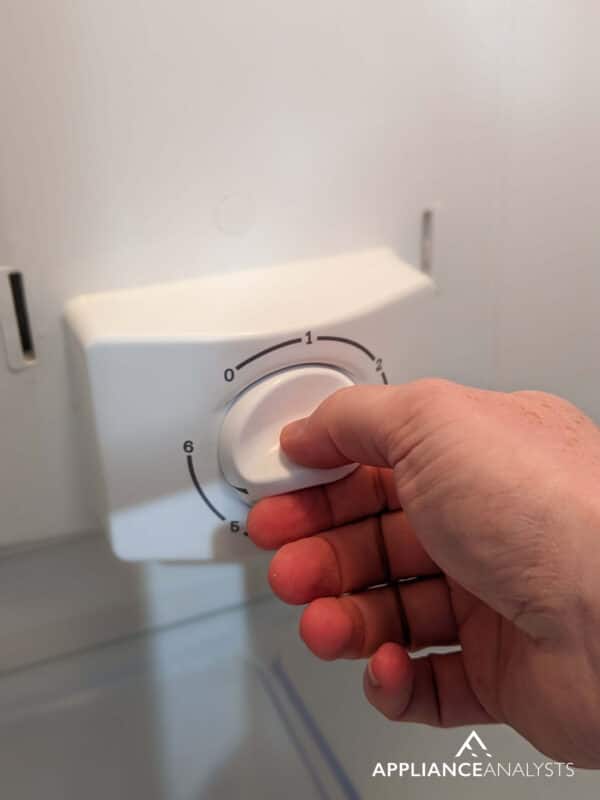
#4 Clean the Condenser Coils
If your condenser coils aren’t clean, it’s no wonder your Bosch fridge is not cooling. When the coils are covered in dust and dirt, they force the fridge to work harder to stay cool, which translates into poor performance and decreased efficiency.
Cleaning the dust and dirt off of the condenser coils is key. Here are two ways that you can clean the coils:
- Use a vacuum brush head tool to clean over and in between the coils. A brush head with bristles will work best.
- Use a dusting cloth to wipe the dust and dirt away from the condenser coils.
- NOTE: To keep your fridge in the best working order, you must clean the coils often.
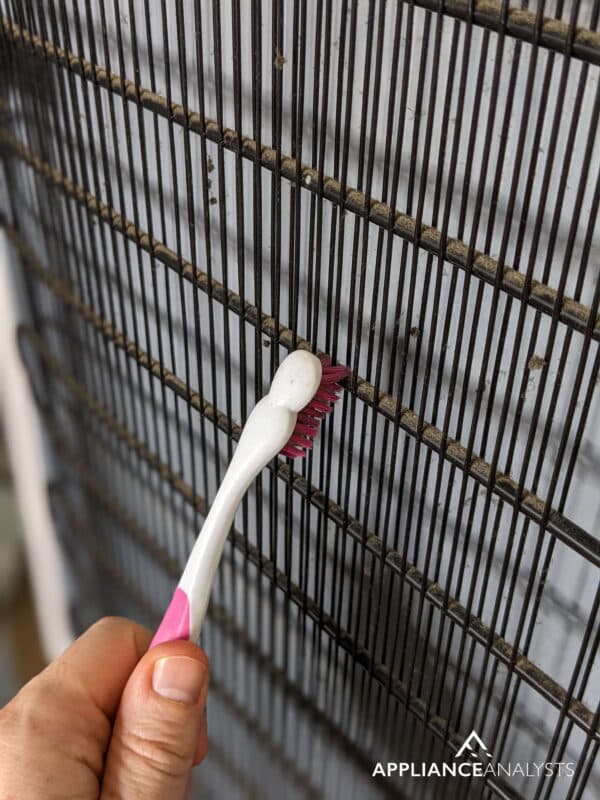
#5 Avoid Sunlight and Heat
Direct heat and sunlight could also explain why your Bosch refrigerator is not cooling. If your fridge is constantly bombarded by heat, it will find it harder to remain cold – especially during the warm summer months.
To protect your Bosch refrigerator from excess heat:
- Keep the fridge away from direct sunlight.
- Keep the fridge away from hot appliances such as ovens or even radiators.
#6 Keep the Fridge Away From the Wall
If your Bosch refrigerator is not cooling, it can also be due to a lack of breathing room. Fridges need space to dissipate heat, so if yours is nestled against a wall or other appliances, it’ll struggle to stay cool.
To properly position your fridge:
- Keep the refrigerator at least 1 inch away from the wall behind it.
- Keep the refrigerator at least 1 inch away from other appliances on either side.
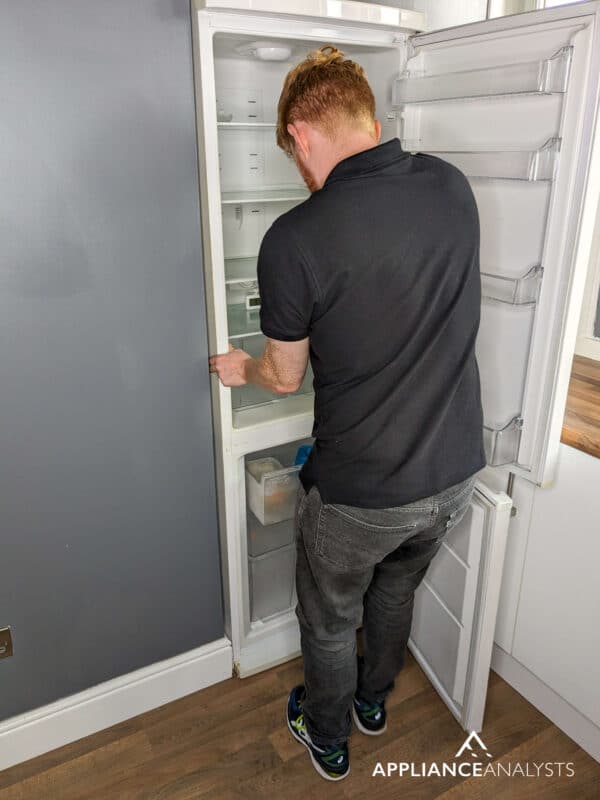
#7 Do Not Overload the Fridge
None of us like being overworked, and your Bosch refrigerator feels the same. When you overload your refrigerator, you disrupt the airflow inside it. From what I’ve seen over the years, overstocking your fridge can cause air vent blockages, resulting in poor cooling performance.
Here are some tips that will help you keep your Bosch refrigerator clear:
- Stock your fridge ⅔ full.
- Revise the contents of your fridge weekly and remove anything that has passed its use-by date.
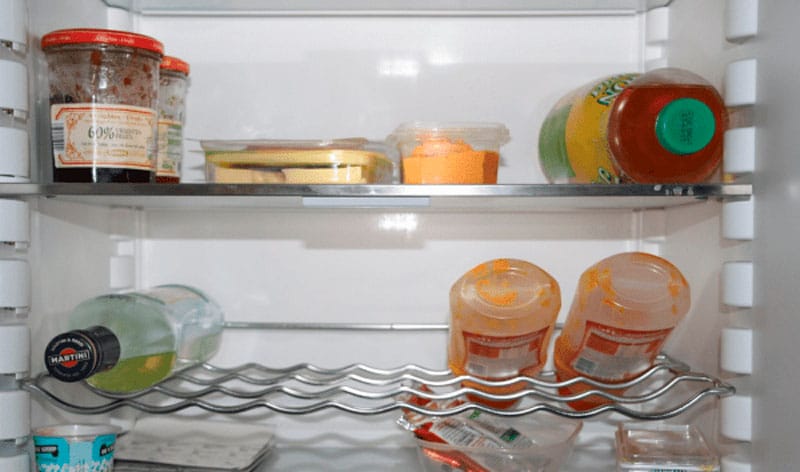
#8 Clean the Door Gaskets
Damaged door gaskets could also explain why your Bosch refrigerator is not cooling.
Your appliance’s doors are the barrier between the warm environment outside and the fresh and cool air inside. If your door gaskets are loose, they will begin to let in warm air. If the door gaskets are dirty, they will also start to let warm air into your fridge.
When warm air leaks inside your fridge, it will be forced to work harder. Most modern fridges can put up with air leaks. However, if you have a slightly older Bosch fridge model, it can struggle to stay as cool as you’d like it to.
To stop air leaks from happening:
- Replace loose gaskets.
- Clean dirty gaskets.
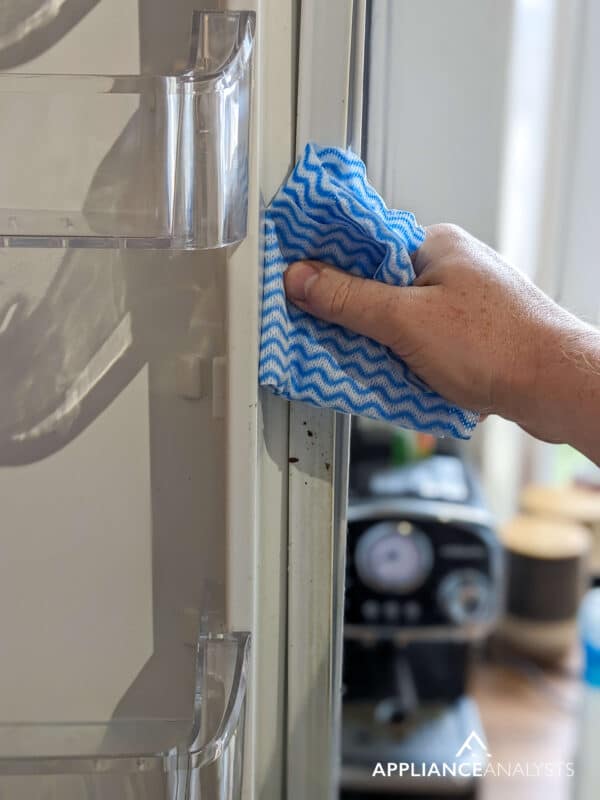
If you want to get any replacement part – or see how much one would cost – click to enter your model number in the search bar below. Our partners at AppliancePartsPros stock almost every part with free guides on how to install them.

#9 Check the Condenser Fan
The condenser fan helps greatly with your Bosch refrigerator’s cooling process, so if it’s failing, it could explain why the appliance isn’t cooling.
In my experience, the condenser fan is typically located behind the fridge, near the compressor. When the compressor kicks in, so should the fan. If the fan isn’t starting, I recommend unplugging your fridge and looking for obstructions.
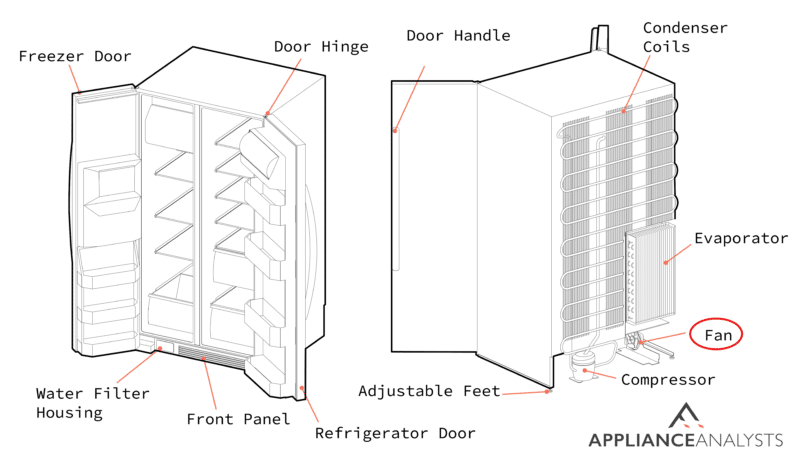
If the fan still doesn’t run, you’ll need to call a repair technician.
#10 Look for Excess Frost
When your Bosch refrigerator isn’t cooling, it might be due to excess frost. I know it’s counterintuitive that an appliance that’s supposed to be cold can be affected by ice buildup, but everything has its limits.
To check for excess frost, carefully move your refrigerator and look behind it where the coils are. If you spot too much frost, there’s a defrost issue, which can be blamed on a bad control board, heater, defrost sensor, or high-limit fuse.
#11 Check the Damper Door
The damper door allows your Bosch fridge and freezer to share cool air as needed. However, airflow is affected when the door dislodges, breaks, or gets stuck due to mechanical errors or frost buildup.
Look closely at your fridge’s damper door to see whether anything prevents it from working normally.
#12 Replace the Faulty Start Capacitor
A faulty capacitor could be why your Bosch refrigerator is not cooling.
The capacitor gives the compressor a ‘boost’ of power when you start it up. If the capacitor is faulty, the compressor likely won’t start. To check the start capacitor’s operation, test it with a multimeter. If there’s no continuity in the reading, you’ll need to replace the capacitor.
If you want to get any replacement part – or see how much one would cost – click to enter your model number in the search bar below. Our partners at AppliancePartsPros stock almost every part with free guides on how to install them.

#13 Replace the Faulty Temperature Control Board
If the temperature control board is faulty, it won’t send voltage to the cooling system, and your Bosch fridge won’t cool.
Before you consider replacing the whole board, check all of the most commonly defective components first to save time and money, as boards can be easily misdiagnosed. Either test the board yourself if you’re skilled in electronics or contact your nearest Bosch retailer to test the board for you.
Lost Your Bosch Refrigerator Manual?
Troubleshooting is always easier when you have your User Manual handy. Provided you don’t have yours, please visit the links below to find and print your Bosch refrigerator’s User Manual.
You may want to go straight to Bosch for expert advice and other pro tips; their contact details are below.
BOSCH TECHNICAL SUPPORT HELPLINE
1-800-944-2904
LINK FOR BOSCH TECHNICAL SUPPORT ONLINE
BOSCH TECHNICAL SUPPORT VIA TEXT
24/7 SERVICE – TEXT ‘SUPPORT’ TO 21432
Fixing a Bosch Refrigerator Not Cooling
When your Bosch refrigerator is not cooling, it’s understandable that you start worrying about food spoiling and paying costly technician rates.
Luckily, as I hope this piece has helped you better understand, addressing the most common causes behind a Bosch refrigerator not cooling is easy. Simple things, like keeping the refrigerator coils clean and ensuring the door gaskets create an airtight seal, will do the trick.
Thanks for reading. If this article was useful and answered your questions, please check out our other free resources and guides below and consider subscribing to our newsletter.
Have a great day!
-Craig.

